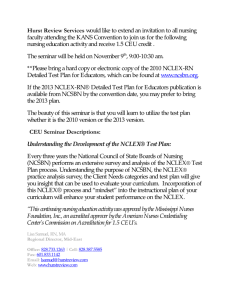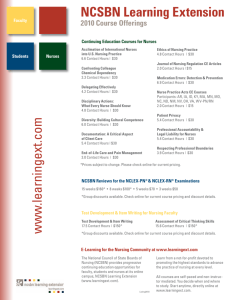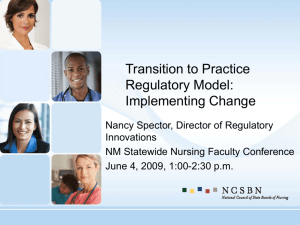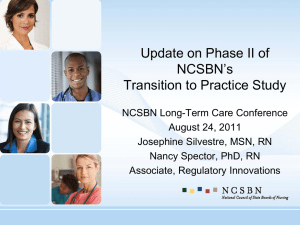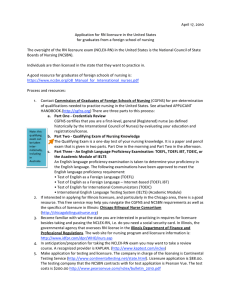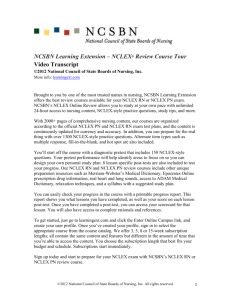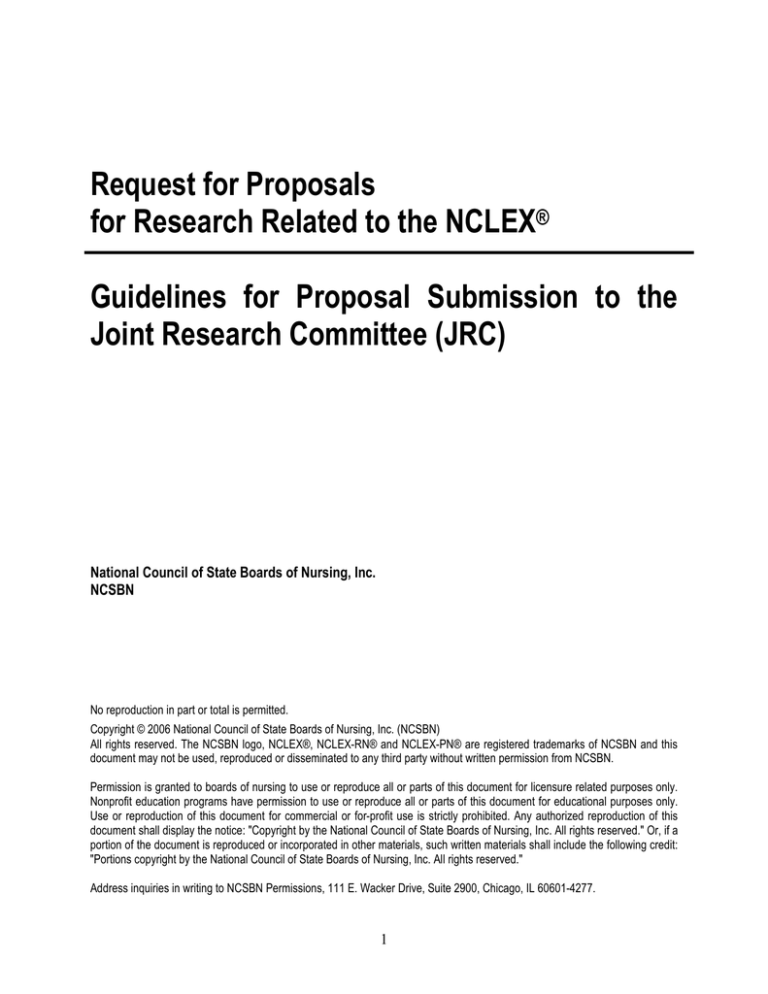
Request for Proposals
for Research Related to the NCLEX®
Guidelines for Proposal Submission to the
Joint Research Committee (JRC)
National Council of State Boards of Nursing, Inc.
NCSBN
No reproduction in part or total is permitted.
Copyright © 2006 National Council of State Boards of Nursing, Inc. (NCSBN)
All rights reserved. The NCSBN logo, NCLEX®, NCLEX-RN® and NCLEX-PN® are registered trademarks of NCSBN and this
document may not be used, reproduced or disseminated to any third party without written permission from NCSBN.
Permission is granted to boards of nursing to use or reproduce all or parts of this document for licensure related purposes only.
Nonprofit education programs have permission to use or reproduce all or parts of this document for educational purposes only.
Use or reproduction of this document for commercial or for-profit use is strictly prohibited. Any authorized reproduction of this
document shall display the notice: "Copyright by the National Council of State Boards of Nursing, Inc. All rights reserved." Or, if a
portion of the document is reproduced or incorporated in other materials, such written materials shall include the following credit:
"Portions copyright by the National Council of State Boards of Nursing, Inc. All rights reserved."
Address inquiries in writing to NCSBN Permissions, 111 E. Wacker Drive, Suite 2900, Chicago, IL 60601-4277.
1
Table of Contents
Program Description .............................................................................................................. 3
JRC Background .................................................................................................................... 3
About the NCSBN .............................................................................................................. 3
Governance of the NCSBN ................................................................................................ 3
Eligibility ................................................................................................................................. 3
Funding Guidelines ................................................................................................................ 4
Project Categories .............................................................................................................. 4
Allowable Funding .............................................................................................................. 4
Award Terms & Conditions ..................................................................................................... 4
Confidentiality Requirements .............................................................................................. 4
Timeline Requirements ...................................................................................................... 4
Grant Process ........................................................................................................................ 4
Award Cycle ....................................................................................................................... 4
Payments ........................................................................................................................... 5
Final Research Reports ...................................................................................................... 5
Proposal Preparation Instructions .......................................................................................... 5
Proposal Format ................................................................................................................. 5
Proposal Contents .............................................................................................................. 6
Cover Page .................................................................................................................. 6
Project Summary ......................................................................................................... 6
Proposal Narrative ....................................................................................................... 6
Project Timeline ........................................................................................................... 6
Budget Summary and Budget Justification Narrative ................................................... 6
Project Personnel ........................................................................................................ 7
Proposal Evaluation & Selection ............................................................................................ 7
Importance of the Research ............................................................................................... 7
Quality of the Research Design .......................................................................................... 7
Submission Instructions ......................................................................................................... 8
Electronic Submission ........................................................................................................ 8
Proposal Checklist.............................................................................................................. 8
Notification of Proposal Receipt.......................................................................................... 8
Confidentiality Agreement .................................................................................................. 8
Contact Information ................................................................................................................ 8
2
Program Description
The National Council of State Boards of Nursing (NCSBN) and Pearson VUE Joint Research Committee
(JRC) invites proposals for research related to the NCLEX examination program. The JRC develops a
research agenda to directly benefit the NCLEX examination program and facilitate the execution of that
research. To this end, the JRC solicits and reviews research proposals that address this type of research.
Of these proposals, those with the most direct benefit are funded. The JRC does not provide funding for
research that is only tangentially is related to NCLEX or is primarily about nursing or education issues.
JRC Background
The JRC is a committee composed of NCSBN staff, staff from our contracted testing service (PearsonVUE) and selected external researchers. The committee was formed to encourage research that supports
the continued use of the NCLEX examinations for initial licensure or that supports potential
enhancements to the NCLEX process.
About the NCSBN
Nearly 100 years ago, boards of nursing were established by state governments to protect the public’s
health by overseeing and ensuring the safe practice of nursing. Boards of nursing (BON) achieve this
mission by establishing the standards for safe nursing care and issuing licenses to practice nursing. Once
a license is issued, the board’s job continues by monitoring licensees’ compliance to state laws and taking
action against the licenses of those nurses who have exhibited unsafe nursing practice.
The BONs in the 50 states, the District of Columbia, and four United States territories--Guam, Virgin
Islands, American Samoa, and the Northern Mariana Islands--comprise the membership of NCSBN. The
purpose of NCSBN is to provide an organization through which BONs act and counsel together on
matters of common interest and concern affecting the public health, safety and welfare, including the
development of entry-level, nurse licensing examinations. NCSBN's programs and services include
developing the NCLEX-RN® and NCLEX-PN® examinations.
Governance of the NCSBN
The policy-making body of NCSBN is its Delegate Assembly, which is composed of two representatives
from each Member Board of nursing. Once a year, delegates from the Member Boards convene in a
Delegate Assembly to determine the direction and policies of NCSBN and to elect individuals to
NCSBN's Board of Directors. Between annual meetings of the Delegate Assembly, a nine-member, elected
Board of Directors is charged with overseeing implementation of policy and directing the activities of
NCSBN.
In addition to the Board of Directors, there are several standing committees and several special
committees that are charged with specific initiatives and objectives. Almost all of these committees are
composed of BON staff or BON board members. The JRC is the exception.
Eligibility
The NCSBN welcomes proposals from institutions of higher education; public and private organizations,
institutions, and agencies; and individuals. Affiliation or partnership with a university or nursing school
is not required. While graduate students typically may not serve as Principal Investigator (PI), they are
encouraged to propose projects with a faculty member who would serve as PI.
3
Funding Guidelines
Project Categories
The JRC provides various levels of funding dependant on the complexity of the request and the research
design.
Allowable Funding
The JRC may reimburse expenses directly related to conducting the project. Examples of these expenses
include: researcher’s time, consultant’s time, graduate student’s salary (if it is part of a graduate
assistantship the cost of some benefits can be included, such as, health-care insurance, etc.), projectrelated travel, equipment and software, etc. Equipment and software purchased with JRC funds become
the property of NCSBN, unless otherwise negotiated.
The JRC may not reimburse expenses that are not directly related to conducting the project. Indirect costs
or other overhead charges are examples of non-reimbursable expenses. (If you are uncertain whether an
expense is reimbursable, please contact NCSBN’s Associate Director of NCLEX Examinations).
Award Terms & Conditions
All research conducted and reports provided become the exclusive property of NCSBN. In alignment
with NCSBN’s corporate values, this research program will support collaboration through the selective
dissemination of research results to the external scholarly community. While researchers will be
encouraged to submit their research for publication, they must first obtain specific, written permission for
each presentation or publication they wish to submit.
Confidentiality Requirements
Before researchers are granted access to NCSBN data, they must agree in writing that they will neither
release nor publish the data or results of research based upon that data without the permission of
NCSBN. A signed Confidentiality Agreement must be submitted upon receipt of a letter from NCSBN.
Timeline Requirements
Proposal acceptance includes agreement on a specified timeline and schedule of deliverables.
Researchers will be asked to present a progress report every six months at the JRC meetings.
If the original project completion date is exceeded, researchers must apply for a re-authorization to
continue. This application will be negotiated with NSCBN. NCSBN reserves the right to terminate a
project that is not completed within the agreed-upon timeframe.
Grant Process
Award Cycle
The JRC meets twice a year, in March and August. Typically, the agenda for each meeting includes the
review of proposals, presentations of completed research, updates on in-progress research, discussion of
future research topics, discussions on how to solicit future research and plans for future meetings.
4
To have your proposal considered, it should be submitted by February 1 for the spring funding cycle or
July 1 for the fall funding cycle. Proposals received after February 1 or July 1 may have to be deferred to
the next funding cycle.
Payments
Funds are typically dispersed upon completion of the project and approval of the final report.
Alternative payment schedules may be considered for projects that might involve large up-front
expenses.
Research Agenda
The JRC develops and maintains a research agenda, which is posted on the NCSBN website. This agenda
is reviewed periodically and updated based on any substantial changes.
Final Research Reports
Upon completion of the research project, grantees are required to submit a final research report, in
electronic format. This will facilitate the dissemination of the results as part of the NCLEX Research
Report Series. Research reports may be posted on the NCSBN website at the discretion of NCSBN.
Research reports funded by the JRC become the exclusive property of NCSBN. Before researchers are
granted access to NCSBN data, they must agree in writing that they will neither release nor publish the
data or results of research based upon that data without the specific, written permission of NCSBN.
Proposal Preparation Instructions
Proposals must be submitted electronically. All proposals must include: title page form, project
summary, proposal narrative, timeline, vitae for project personnel, budget summary form and budget
narrative. Detailed instructions for each of these pieces are provided below. A signed Confidentiality
Agreement is also required upon acceptance of the proposal and a letter from NCSBN.
Researchers may provide other relevant information, including pertinent exhibits, but each proposal
must be a self-contained document.
Only the materials included in the proposal at the time of submission will be sent to the review panel.
Proposals may be rejected without review by the JRC if they do not appear to be related to supporting the
current use of or provide possible future enhancements.
Proposal Format
The NCSBN believes that our reviewers will be able to conduct the highest quality review when
proposals are concise and easy to read. Therefore, we request those submitting proposals strictly adhere
to the following specifications:
1.
2.
3.
4.
5.
All elements (except for the Curriculum Vitae and the Confidentiality Agreement) should be
included in one file, in either Microsoft Word or Adobe (PDF) formats.
12-point Times New Roman font
Double-spaced
One-inch margins at the top, bottom, and on both sides
Pages numbered consecutively
5
Proposal Contents
The JRC believes that strong proposals will clearly address each of the selection criteria outlined in the
Proposal Evaluation and Selection section of this Request for Proposals. Strong proposals also will make
well-reasoned and compelling cases for the significance of the questions or issues that will be the subject
of the proposed research, and present research designs that are complete, clearly delineated, and
incorporate sound research methods. In addition, the personnel descriptions included in strong proposals
will make it apparent that the principal investigator(s), and other key personnel possess training and
experience commensurate with their duties.
All proposals should include:
•
Cover Page
•
Project Summary
Use the Cover Page Template as the cover for your proposal. This template is included in
Appendix A of this document, and is also available on our website.
The project summary should contain the following:
(1) a description of the question or issue being addressed and why that is important
(2) a summary of the methodology being used and why that approach will yield the intended
results, and
(3) the intended results or outcomes of the work and a summary of why those results or
outcomes are important to the NCLEX examination program.
If your proposed research project is funded, this summary may be used by the JRC in various
publications as a description of your project. It may also be the basis of a public
announcement about the funds awarded for the project.
•
Proposal Narrative
The project narrative should not exceed the equivalent of 12 double-spaced pages. Reviewers
have the discretion to ignore material on pages 13 or higher.
The narrative should address the following:
1) The research question and its significance to the JRC Research Agenda;
2) A review of the pertinent literature that provides a rationale for the proposal;
3) Description of the methods and analytical techniques; and
4) Importance of findings for the NCLEX examination program.
•
Project Timeline
•
Budget Summary and Budget Justification Narrative
In order for the JRC to evaluate the likelihood for the proposed project to be completed
within the desired timeframe, all submissions should include a project timeline. This
timeline does not count against the 12 page limit of the proposal narrative. The timeline
should include a schedule of deliverables. The timeline will be used to establish a completion
date for the project. If the project cannot be completed within the approved timeline,
researchers must apply for a re-authorization to continue.
A complete budget for the project must be included (use the Budget Summary Form in
Appendix A of this package, or a comparable table). The budget summary and budget
justification narrative do not count against the 12-page limitation of the proposal narrative.
The budget should be clearly delineated and warranted in terms of the proposed activities. It
6
will be important to indicate that the amount of funding requested is reasonable.
Purchases of computer hardware and software are discouraged. If they are required for the
project, they become property of NCSBN upon completion of the project.
•
Project Personnel
Include abbreviated biographical information for the principal investigator(s) and other key
personnel. Curriculum vitae should be included in a single document, separate from the rest
of the proposal. Vitae do not count against the 12-page limitation of the proposal narrative.
Proposal Evaluation & Selection
Proposals that are submitted are subjected to a two-stage review. The initial review is performed by
NCSBN staff and acts as a preliminary screening. In this stage, the proposals are reviewed for:
1) Adequacy and completeness of the proposal. This includes issues of format and verification that
the essential components of the proposal are present.
a. When incomplete or incomprehensible proposals are received, they will be returned to
the author with a brief explanation of the reason.
2) General appropriateness of the proposal. Proposals that do not have a clear benefit to the NCLEX
examination program will be summarily excluded from further consideration.
a. Proposals that address topics that are primarily about nursing issues and do not have a
clear and specific expected benefit to the NCLEX will not be considered for funding.
In the second stage of the review process, proposals are reviewed at the semi-annual meetings of the JRC.
Council members are asked to consider the proposal’s utility to the NCLEX exam program, feasibility,
adherence with the JRC’s research agenda, appropriateness of the budget, quality of the research design,
and credibility of the researchers.
Importance of the Research
In determining the importance of the proposed project, the reviewers will consider the importance of
the question or issue to be addressed especially with regard to the potential contribution the results
will have for supporting or enhancing the NCLEX examination.
Quality of the Research Design
In determining the quality of the proposed research design, the reviewers will consider the following
factors:
• whether a specific research design has been proposed, and the quality and appropriateness of
that design, including the scientific rigor of the studies involved.
•
the extent to which the research design includes a high-quality review of the relevant
literature, a high-quality plan for research activities, and the use of appropriate theoretical
and methodological tools.
•
the likelihood of the resulting research being of publishable quality
Quality and Potential Contributions of the Project Personnel
In determining the quality and potential contribution of the proposed project personnel, the
7
reviewers will consider the qualifications, including training and experience, of:
•
•
•
the principal investigator(s);
key project personnel; and
any proposed consultants or subcontractors.
Submission Instructions
Electronic Submission
All proposals must be sent via e-mail as Microsoft Word documents or Adobe pdf files to
toneill@ncsbn.org. Proposals submitted in paper format will not be accepted.
Proposal Checklist
The proposal should include the following pieces (see the appendices for samples and templates).
Email with two attached Adobe PDF or Word files
File One to include:
Cover Page
Project Summary
Proposal Narrative
Project Timeline
Budget Summary
Budget Justification Narrative
File Two to include:
Curriculum vitae of the principal investigator(s) and key personnel
Notification of Proposal Receipt
Once your electronic submission has been received by the NCSBN, you will be emailed a Notification of
Proposal Receipt.
Confidentiality Agreement
If your proposal is accepted, you will be asked to complete a Confidentiality Agreement (see Appendix
D).
Contact Information
For additional information or clarification about this submission process, please contact:
Ada Woo, Ph.D.
Senior Psychometrician
National Council of State Boards of Nursing
111 E. Wacker Drive, Suite 2900
Chicago, Illinois 60601-4277
Email: awoo@ncsbn.org
8

